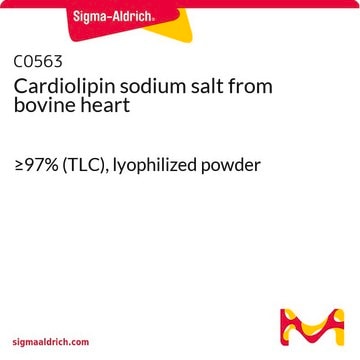ABE2939
Anti-PrimPol
Synonyme(s) :
DNA-directed primase/polymerase protein, hPrimpol1;Coiled-coil domain-containing protein 111
About This Item
Produits recommandés
Source biologique
rabbit
Niveau de qualité
Forme d'anticorps
purified antibody
Type de produit anticorps
primary antibodies
Clone
N/A, polyclonal
Poids mol.
calculated mol wt 64.41 kDa
observed mol wt ~65 kDa
Produit purifié par
affinity chromatography
Espèces réactives
human
Conditionnement
antibody small pack of 100 μg
Technique(s)
western blot: suitable
Isotype
IgG
Séquence de l'épitope
C-terminal
Numéro d'accès Protein ID
Numéro d'accès UniProt
Température de stockage
2-8°C
Informations sur le gène
human ... PRIMPOL(201973)
Description générale
Spécificité
Immunogène
Application
Evaluated by Western Blotting in U2OS cell lysate.
Western Blotting Analysis (WB): A 1:1,000 dilution of this antibody detected PrimPol lysate from U2OS cells, but not in cells with PrimPol knockout.
Tested applications
Fluorescence Activated Cell Sorting (FACS): A representative lot detected PrimPol in I Fluorescence Activated Cell Sorting applications (Tirman S., et al (2021). Mol Cell. 81(19); 4026-4040).
Immunocytochemistry Analysis: A representative lot detected PrimPol in Immunocytochemistry application (Tirman S., et al (2021). Mol Cell. 81(19); 4026-4040).
Note: Actual optimal working dilutions must be determined by end user as specimens, and experimental conditions may vary with the end user.
Forme physique
Stockage et stabilité
Autres remarques
Clause de non-responsabilité
Vous ne trouvez pas le bon produit ?
Essayez notre Outil de sélection de produits.
Code de la classe de stockage
13 - Non Combustible Solids
Classe de danger pour l'eau (WGK)
WGK 1
Point d'éclair (°F)
Not applicable
Point d'éclair (°C)
Not applicable
Certificats d'analyse (COA)
Recherchez un Certificats d'analyse (COA) en saisissant le numéro de lot du produit. Les numéros de lot figurent sur l'étiquette du produit après les mots "Lot" ou "Batch".
Déjà en possession de ce produit ?
Retrouvez la documentation relative aux produits que vous avez récemment achetés dans la Bibliothèque de documents.
Notre équipe de scientifiques dispose d'une expérience dans tous les secteurs de la recherche, notamment en sciences de la vie, science des matériaux, synthèse chimique, chromatographie, analyse et dans de nombreux autres domaines..
Contacter notre Service technique








